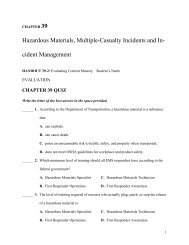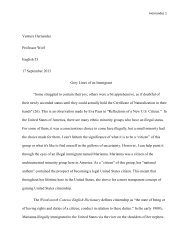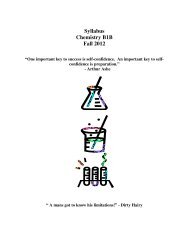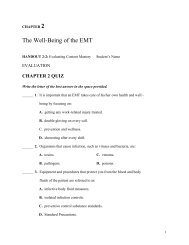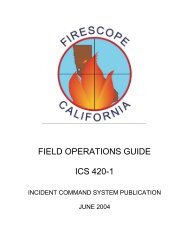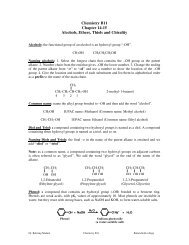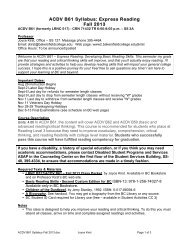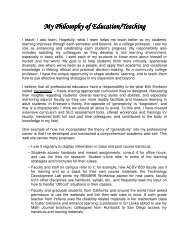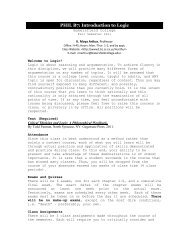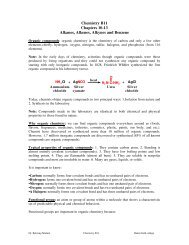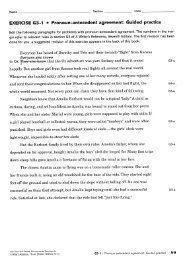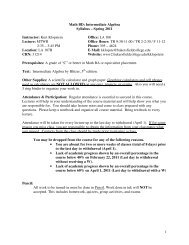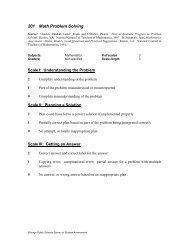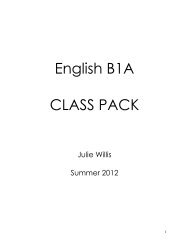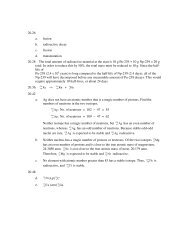ASL 2 Syllabus - Bakersfield College
ASL 2 Syllabus - Bakersfield College
ASL 2 Syllabus - Bakersfield College
Create successful ePaper yourself
Turn your PDF publications into a flip-book with our unique Google optimized e-Paper software.
<strong>ASL</strong> B2<br />
American Sign Language II<br />
Tom Moran<br />
Spring 2011
TABLE OF CONTENTS..................................................................................................2<br />
Catalog Description ..........................................................................................................3<br />
Course Resources ..............................................................................................................3<br />
Course Philosophy............................................................................................................4<br />
Student Learning Objectives ...........................................................................................5<br />
Class Attendance...............................................................................................................5<br />
Student Evaluation ...........................................................................................................6<br />
Grading Scale.....................................................................................................................6<br />
Grading Standard..............................................................................................................6<br />
Nuts and Bolts ...................................................................................................................7<br />
Accessibility .......................................................................................................................7<br />
Important Dates.................................................................................................................8<br />
Your Instructor ..................................................................................................................8<br />
Student Absences ..............................................................................................................9<br />
Phone List...........................................................................................................................9<br />
Life Happens......................................................................................................................9<br />
Last Word...........................................................................................................................9<br />
BC <strong>ASL</strong> Program Deaf Events Policy...........................................................................10<br />
Assignment Schedule .....................................................................................................12<br />
1. Abbe Charles Michel De l’Eppe (1712-‐1789), the “Father of the <br />
Deaf.” <br />
2. Thomas Hopkins Gallaudet (1787-‐1851), for whom Gallaudet <br />
University is named. <br />
3. Laurent Clerc, a Deaf Frenchman who had an inestimable impact on <br />
American Deaf culture. <br />
4. The American School for the Deaf in Hartford, Conn. (founded in <br />
1817), the first Deaf school in the U.S. and still in operation today. <br />
5. Gallaudet students protesting at the U.S. Capitol, demanding a Deaf <br />
president be named to head Gallaudet University for the first time in <br />
its 124-‐year history. <br />
6. Deaf students at a residential school signing a song, likely a hymn or <br />
patriotic tune. <br />
7. Robert McGregor, the first president of the National Association of <br />
the Deaf, performing for a film in 1915, designed to preserve Sign <br />
Language. <br />
8. Gallaudet students and supporters marching on the U.S. Capitol in <br />
the Deaf President Now protest. <br />
9. Two Deaf children who, although wearing hearing aids, <br />
communicate in their natural language, <strong>ASL</strong>. <br />
2
CATALOG DESCRIPTION<br />
<strong>ASL</strong> B2 American Sign Language II (5 units) Continued study of the fundamentals of American Sign<br />
Language. Emphasizes grammatical structure, various sentence types, giving directions, conceptual<br />
accuracy, vocabulary, verb agreement, and increased fingerspelling and numerical proficiency. Further<br />
development of conversational strategies. Exploration of Deaf culture emphasizing Deaf history in the<br />
U.S. Prerequisite: <strong>ASL</strong> B1. Hours: 90 lect. Field trips required. Offered: F,S. CCS: Occupational<br />
Education. Transferable: UC, CSU and private colleges. BC GE 6; CSU GE C.2; IGETC 3.B.<br />
COURSE RESOURCES<br />
1. Course Information<br />
• <strong>ASL</strong> B2 CRN# 30304<br />
• Time: MW 2:35 – 5:05 p.m.<br />
• Room: LA 203<br />
2. Required Materials:<br />
• Smith, Cheri, Ella Mae Lentz, and Ken Mikos. Signing Naturally Level I. San Diego, Dawn Sign<br />
Press, 1988.<br />
• <strong>ASL</strong> 2 Class Packet. Moran, Tom. <strong>Bakersfield</strong> <strong>College</strong> Graphics Center, 2008.<br />
• Register online for <strong>ASL</strong> 2 at Cyber<strong>ASL</strong>.com. For those who prefer to avoid e-commerce, prepaid<br />
cards are available in the BC bookstore.<br />
3. Instructor Contact:<br />
• Tom Moran<br />
Dept. Chair, Foreign Languages/<strong>ASL</strong><br />
Professor, American Sign Language<br />
Office:<br />
Phone:<br />
Email:<br />
Website:<br />
LA 215D<br />
661.395.4537 v 661.369.8829 vp<br />
tmoran@bakersfieldcollege.edu<br />
www2.bakersfieldcollege.edu/tmoran<br />
Office Hours: M 11:00 a.m. – 2:00 p.m.<br />
T<br />
W<br />
Th<br />
11:00 a.m. – 2:00 p.m.<br />
11:00 a.m. – 2:00 p.m.<br />
11:00 a.m. – 2:00 p.m.<br />
And by appointment<br />
I am difficult to reach by phone outside of office hours. It is much easier for you to<br />
contact me by email, and you are assured of a quicker response. However, should<br />
you choose to call me, before your message, speak slowly and clearly, telling me your<br />
name, class, and phone number. And please be patient in waiting for a response.<br />
3
COURSE PHILOSOPHY<br />
<strong>ASL</strong> is a language, just like Spanish, German, or Russian; therefore, <strong>ASL</strong> B2 is a language workshop.<br />
Unlike most other languages, it is visual-spatial with no written form. Our text, Signing Naturally, is<br />
written by authors who are pioneers in the field of <strong>ASL</strong> instruction. They have organized the curriculum<br />
to reflect the visual nature of the language while at the same time encouraging you to have fun in your<br />
language workshop. In order to learn sign language in the most authentic and efficient manner possible,<br />
there will be a minimum of talking in class. Failure to comply with our “NO TALKING” policy will result<br />
in disciplinary action, which may include being dropped from the course. In order for you to become<br />
immersed in <strong>ASL</strong> and Deaf culture, I have six suggestions:<br />
1. You must come to every class meeting.<br />
• Before coming to class, review the previous class lesson.<br />
• Come to class early.<br />
• Sign before, during, and after class.<br />
• Avoid using your voice at all costs.<br />
2. Early in the semester, choose two or three classmates to form a study group.<br />
• Meet regularly with these study partners.<br />
• Develop questions to ask your instructor for the following class meeting.<br />
• Always sign in the presence of your study partners.<br />
3. Seize every opportunity to interact with members of the Deaf community.<br />
• Attend Deaf events often; write a one-page report and turn it in within one week (see pg. 6).<br />
• NEVER pretend to be deaf.<br />
• ALWAYS sign when in the presence of a Deaf person (even if not communicating directly with<br />
him or her).<br />
• Don’t wait until the end of the semester to do your community hours; by then, it’s too late.<br />
4. If you begin to feel behind or lost. . .<br />
• visit your instructor in his office.<br />
• see a tutor for help.<br />
• sign with members of the Deaf community.<br />
• sign with members of the class.<br />
5. Always do your homework.<br />
• Complete all homework on time.<br />
• Don’t look up answers in the back of the book (getting the right answer is not the goal).<br />
• Watch your videotape/DVD as often as necessary.<br />
• Do your homework every day, not just once or twice a week.<br />
• Exposure and repetition is the goal.<br />
6. I know you are excited to be in <strong>ASL</strong> 2, BUT<br />
• don’t correct other teachers’ students regarding sign choices.<br />
• never correct a Deaf person regarding sign choices.<br />
4
STUDENT LEARNING OBJECTIVES<br />
Upon completion of <strong>ASL</strong> 2, students will:<br />
1. Produce fluently and comprehend five-to-six letter fingerspelled words.<br />
2. Compose spontaneous conversations producing various sentence types in <strong>ASL</strong>, including Y/N, WH,<br />
rhetorical questions, negative complex, and conditional statements.<br />
3. Organize basic conversational strategies, including getting attention, asking for repetition,<br />
interrupting, providing feedback, and opening and closing conversations.<br />
4. Produce and understand moderately complex directions using <strong>ASL</strong> classifiers, including descriptive,<br />
locative, and body-part classifiers, as well as spatial referencing.<br />
5. Produce narratives using appropriate role-shifting techniques to discuss at least two characters.<br />
6. Demonstrate and recognize inflecting verbs.<br />
7. Demonstrate and recognize numbers 101-1,000, clock numbers, and money numbers.<br />
8. Consider and demonstrate an understanding of the differences between hearing and Deaf cultures,<br />
especially language, norms, and mores by analyzing and evaluating <strong>ASL</strong> storytelling, disclosure of<br />
personal information in the community, and an overview of the history of Deaf people in the U.S.<br />
CLASS ATTENDANCE<br />
<strong>ASL</strong> B2 is a language workshop; if you are to learn this language, your attendance is mandatory. I do<br />
understand, however, that the circumstances of your life may occasionally prevent you from attending<br />
class. I will allow a maximum of four absences, the equivalent of two weeks’ instruction. If you are absent<br />
more than four times, I may drop you from the course.<br />
To encourage your promptness and attendance over the course of the semester, I will regularly assign<br />
homework , or in-class work , and I will give pop quizzes. I will drop the lowest score (including 0); as a<br />
result, under no circumstances will I give make-ups. If you are absent, for whatever reason, it is your<br />
responsibility to contact a classmate to see what work has been assigned or to turn in your homework for<br />
you. Quizzes and homework assignments are worth 15% of your grade. See Student Absences on page 9.<br />
I offer you my personal guarantee that I will treat every student in my course<br />
equally and objectively. I promise that I will assign to you the grade that you<br />
earn, without resorting to favoritism or consideration of extenuating<br />
circumstances. You, alone, are the primary determinant of your grade. I will<br />
assist you in any way that I can, during the course of the semester, to achieve<br />
the highest grade that you can attain. At the conclusion of the semester, I will<br />
total your points and assign to you the grade that you have earned using the<br />
scale listed on page 6. I wish you good luck and stand ready to assist you.<br />
5
STUDENT EVALUATION<br />
American Sign Language is often thought of as a “fun” class, and rightfully so, it is; however, it is also an<br />
academic study of the language of an American culture—and a university-level transfer course. As such,<br />
it is a serious enterprise as well. I take the study of <strong>ASL</strong> seriously and so should you. Work hard,<br />
complete all assignments, study outside of class, practice signing every day, and attend all class sessions.<br />
This will help you to achieve the grade you deserve.<br />
In calculating your grade, I will consider your completion of all the course requirements based on:<br />
• demonstrated mastery of course objectives;<br />
• correct use of <strong>ASL</strong> grammar and syntax;<br />
• thoroughly written and verifiable deaf community event reports;<br />
• overall academic performance (tests, class participation, no voice);<br />
• promptness in completing all assigned work;<br />
• meeting all other requirements listed.<br />
GRADING SCALE<br />
Homework, quizzes .......................................................................20%<br />
Exams ...............................................................................................30%<br />
*Deaf Community Participation...................................................15%<br />
**Final Exit Interview.....................................................................35%<br />
Total................................................................................................100%<br />
GRADING STANDARD<br />
A (outstanding)....................................................................... 90-100%<br />
B (superior) ................................................................................ 80-89%<br />
C (average)................................................................................. 70-79%<br />
D (barely passing)..................................................................... 60-69%<br />
F (failure)...................................................................................... 59-0%<br />
*One requirement of this course is to attend Deaf community events, interact with members of the Deaf<br />
community, and report on the activity—in writing—to your instructor within one week. The requirement<br />
is for 15 hours over the course of the semester and accounts for 15% of your grade. I will provide you<br />
with a number of opportunities, and you may discover your own. Events of your own choosing must be<br />
approved in advance; otherwise, no credit may be given. One of the most frequent reasons that students<br />
do not pass this course is failure to complete their Deaf community hours. Please plan early to complete<br />
this essential course requirement.<br />
6
** The final exit interview will be a one-to-one conversation with your instructor. This interview will be<br />
the instrument to determine if you have mastered the course outcomes sufficiently to progress to <strong>ASL</strong> 4.<br />
Students earning an A, B, or C before the interview will be eligible for assessment. Students who fail the<br />
interview will receive a D or an F in the course. Students earning a D or an F before the interview will not<br />
be eligible for assessment and will receive that grade in the course.<br />
NUTS AND BOLTS<br />
There are a few behavioral standards you must adhere to:<br />
• ALWAYS keep your entire face visible: no hats, hoods, or sunglasses. You must groom your hair<br />
off of your forehead. No excessively long or multi-colored fingernails, large rings, or jangly<br />
bracelets. Each of these fashion statements creates visual noise and impedes communication.<br />
• NEVER use your mobile phone during class: no talking, no texting. Ever. You MUST maintain<br />
constant visual contact.<br />
• NEVER cheat on an exam. When caught cheating, you will be dealt with swiftly and harshly.<br />
• NEVER turn in a report for an event that you did not attend. Doing so will result in the loss of all<br />
Deaf community hours for the semester, lowering your grade by one and one-half letter grades.<br />
ACCESSIBILITY<br />
Supportive Services helps to ensure that all students have access to the college and its programs by<br />
providing accommodation and support services for students with documented disabilities. Students with<br />
disabilities who believe they may need accommodations in this class are encouraged to contact Disabled<br />
Student Programs & Services (661-395-4334), FACE 16, as soon as possible to better ensure such<br />
accommodations are implemented in a timely fashion. In addition, if you have a<br />
disability that you feel may impact your performance in this class, PLEASE<br />
bring it to my attention as soon as possible. I am committed to your success<br />
and I want to help you.<br />
This class embodies a multicultural philosophy that reflects the makeup of our<br />
college and our society at large. All students are encouraged to participate and<br />
to reflect on the norms of our society as well as those of our individual ethnic or<br />
cultural groups and the culture we are to study. We are all here to learn from each other.<br />
Should you, for whatever the reason, decide to stop attending this<br />
class, it is YOUR responsibility to officially drop the course through<br />
A&R. Do not assume that I will do this. Every semester, several<br />
students who stop attending and do not drop the course earn an “F”<br />
in my class. Please don’t be one of them.<br />
7
IMPORTANT DATES<br />
Jan. 17...........................................................................................Martin Luther King Jr. Holiday<br />
Jan. 18..........................................................................................................First day of instruction<br />
Jan. 28.................................................................... Refund deadline for semester-length classes<br />
Jan. 31.....Last day to add semester-length class with approved enrollment exception form<br />
Feb. 18 .................................................................................................Lincoln’s Birthday Holiday<br />
Feb. 21 .........................................................................................Washington’s Birthday Holiday<br />
Feb. 22 ....................................Deadline to withdraw from semester-length courses w/o a W<br />
Apr. 18 - 23 ..................................................................................................................Spring Break<br />
Apr. 1 ........................................ Deadline to withdraw from semester-length classes w/ a W<br />
Apr. 4 ............................................................................................ Deadline to file for graduation<br />
May 9 - 14 .........................................................................................................Final Examinations<br />
May 13 ...................................................................................................................Commencement<br />
Every semester, I am approached by students who inform me that they have a conflict with the final<br />
exam. Sometimes they tell me that they have a final for another class. This is not possible, as finals are<br />
coordinated with individual class times. If you have an instructor offering a final during my scheduled<br />
time, he or she is doing so at the wrong time. Bring it to your instructor’s attention, or mine, so I can<br />
inform him or her. Another excuse I often hear is that students must take an English exit exam; these<br />
exams are offered at multiple times. If your FEE conflicts with my final, you must reschedule your FEE.<br />
YOUR INSTRUCTOR<br />
I am a hearing person from a hearing family. My parents and two of my siblings are hearing and my<br />
eldest sister is Deaf. Her husband, two of their children, two of their spouses, and one of their grandsons<br />
are Deaf. Most of them are retired from, or currently work in, the field of deaf education, as does my wife.<br />
Since 1989, I have been a professional sign language interpreter and hold certificates of interpretation and<br />
transliteration through RID, the Registry of Interpreters for the Deaf. Since 1995, I have also been a college<br />
instructor; I have a BA in creative writing and an MA in rhetoric and composition theory. I have taught<br />
courses and workshops in English, interpreting, and <strong>ASL</strong> at California State University, Northridge, San<br />
Diego Mesa <strong>College</strong>, <strong>Bakersfield</strong> <strong>College</strong>, and professional conferences throughout the country. When I’m<br />
not teaching or interpreting, I am a husband, father, and photographer.<br />
For information on BC’s <strong>ASL</strong> Program or your instructor, go to:<br />
http://www2.bakersfieldcollege.edu/asl<br />
http://www2.bakersfieldcollege.edu/tmoran<br />
8
STUDENT ABSENCES<br />
In the event of your absence, contact a classmate to find out what took place in class and what<br />
assignments or homework is due. Absence is not an excuse for late or missing work.<br />
PHONE LIST<br />
Classmate<br />
Phone Number<br />
LIFE HAPPENS<br />
Every effort has been made to produce a syllabus that contains accurate and<br />
up-to-date Information; however, this syllabus is tentative and subject to<br />
change. Furthermore, it is your responsibility to attend class and remain<br />
current with any assignments or changes in course requirements or other<br />
information.<br />
LAST WORD<br />
Remember, as your instructor, it is my job to help you. If you find yourself<br />
struggling, don’t go it alone. Ask me for help. I’m available to you in person,<br />
by email, or by phone, during my office hours or a previously arranged appointment. I like teaching and<br />
I like students and I want to help you.<br />
9
Deaf Community Events Policy<br />
<strong>Bakersfield</strong> <strong>College</strong> <strong>ASL</strong> Program<br />
Throughout its nearly 40-year history, the <strong>ASL</strong> Program at <strong>Bakersfield</strong> <strong>College</strong> has worked closely with<br />
<strong>Bakersfield</strong>’s Deaf Community to host and participate in events where students can interact with Deaf<br />
adults and children in <strong>Bakersfield</strong>. This mutually beneficial interaction helps students to improve their<br />
signing fluency and aids their understanding of concepts taught in the classroom.<br />
To help maintain our high standards and to ensure student safety, the BC <strong>ASL</strong> Program has a number of<br />
rules and advisories related to students attending Deaf Community Events. Be sure you read and<br />
understand these rules and advisories before attending any events.<br />
RULES:<br />
1. Under no circumstances may students consume alcohol or be under the influence of any controlled<br />
substances while attending Deaf Community Events. From the BC Student Handbook:<br />
“The Board of Trustees, the college President or designee may suspend a student<br />
for good cause.” . . . which includes “. . . the use, sale, possession, or being under the influence of<br />
alcohol or any other controlled substance prohibited by law, on campus or at any function sponsored<br />
or supervised by the <strong>College</strong>.”<br />
Some students believe that if they are of legal drinking age this policy does not apply to them. That is<br />
incorrect. This policy applies to all students, regardless of age. If a student violates this policy, he or<br />
she may be sanctioned, up to and including being suspended from the college.<br />
2. Students will not talk or use their voices while in the presence of Deaf Community members.<br />
Students attending Deaf Community Events agree to do so with the understanding that, while these<br />
events are social, they are for their educational benefit. Students will sign—to the best of their<br />
ability—while present at Deaf Community Events.<br />
3. Students who knowingly turn in falsified Deaf Community Event Reports (a report for an event that<br />
the student did not attend) will lose all accrued hours and will forfeit the right to earn more hours<br />
during that semester.<br />
4. You may only earn credit by attending Deaf Community Events listed on the <strong>ASL</strong> Program’s website.<br />
If you wish to attend an event not listed there and wish to earn credit, you must secure your<br />
instructor’s approval prior to attending. Events where alcohol is served (i.e. a bar) or illegal<br />
controlled substances are consumed will not be approved under any circumstances.<br />
10
ADVISORIES:<br />
1. Deaf Community Events are attended by BC students and members of the general public. Deaf<br />
community members in attendance are neither screened nor endorsed by the college. Treat Deaf<br />
strangers as you would any stranger—with caution. We recommend that you don’t offer rides to, go<br />
to isolated areas with, or divulge personal information to people you don’t know, whether they are<br />
Deaf or hearing.<br />
Most members of <strong>Bakersfield</strong>’s Deaf Community are known to us and are upstanding citizens;<br />
however, we don’t know everyone and have no way of controlling the movements of individuals.<br />
Please exercise caution and common sense and keep your safety foremost in your thoughts.<br />
2. Deaf Community Events are held for you, the student, and are to assist you in improving your <strong>ASL</strong><br />
fluency.<br />
If you are an <strong>ASL</strong> 1 student, try to be assertive in introducing yourself and joining in conversations.<br />
People are expecting you at these events and are there, generally, to assist you.<br />
If you are an advanced <strong>ASL</strong> student, reach out to younger, less experienced signers and help them to<br />
feel welcome. Don’t sit and chat with only groups of your friends. Assisting a newer student will<br />
reinforce and improve your own knowledge as well. If you have a Deaf friend, introduce him or her<br />
to newer students. Remember, we all attend these events<br />
to learn, and members of our Deaf Community don’t<br />
“belong” to anyone. Remember, too, that you were new<br />
once.<br />
If you are a new student or advanced, remember, don’t<br />
use your voice. If you see other students talking, approach<br />
them and engage them in a signed conversation. If they<br />
still continue to talk, report that behavior to an instructor<br />
and the Deaf person in charge of the event. It is imperative<br />
that we maintain a signing environment that promotes<br />
learning, values <strong>ASL</strong>, and—most importantly—respects<br />
the members of <strong>Bakersfield</strong>’s Deaf Community.<br />
11
ASSIGNMENT SCHEDULE<br />
We have several new issues this semester, so do expect this schedule to change!<br />
Week 1<br />
Unit 9 “Making Requests”<br />
1.17/1.19 Jan. 17 Martin Luther King Jr. Holiday<br />
Week 2<br />
Unit 9 “Making Requests”<br />
1.24/1.26 Unit 7 “Giving Directions”<br />
Jan. 28 Last day for refunds<br />
9<br />
Week 3<br />
Unit 7 “Giving Directions”<br />
1.31/2.2 Jan. 31 Last day to add a class w/ EEF<br />
Week 4 MIDTERM EXAMINATION #1<br />
2.7/2.9 Unit 11 “Attributing Qualities to Others”<br />
Week 5<br />
Unit 11 “Attributing Qualities to Others”<br />
2.14/2.16 Feb. 18 Lincoln’s Birthday Holiday<br />
Week 6<br />
Unit 8 “Describing Others”<br />
2.21/2.23 Feb. 21 Washington’s Birthday Holiday<br />
Feb. 22 Last day to drop course without a “W”<br />
7<br />
11<br />
8<br />
Week 8<br />
Midterm Review<br />
10<br />
3.7/3.9 MIDTERM EXAMINATION #2<br />
Week 9<br />
Unit 10 “Talking About Family and Occupations”<br />
3.14/3.16<br />
Week 10<br />
Unit 10 “Talking About Family and Occupations”<br />
3.21/3.23<br />
12<br />
Week 11<br />
Unit 12 “Talking About Routines”<br />
3.28/3.30 April 1 Last day to drop course with a “W”<br />
Week 12<br />
Unit 12 “Talking About Routines”<br />
4.4/4.6 April 4 Last day to file for graduation<br />
Week 13 MIDTERM EXAMINATION #3<br />
4.11/4.13 Cumulative Review<br />
CR<br />
Week 0<br />
April 18 – 23 Spring Break<br />
4.18/4.20<br />
Week 14<br />
Cumulative Review<br />
4.25/4.27<br />
Week 15<br />
Final Exit Interviews by individual appointment<br />
5.2/5.4<br />
Week 7<br />
2.28/3.2<br />
Unit 8 “Describing Others”<br />
Week 16<br />
Final Exit Interviews by individual appointment<br />
5.9 Monday, May 9 2:00 – 3:50 p.m.<br />
12



